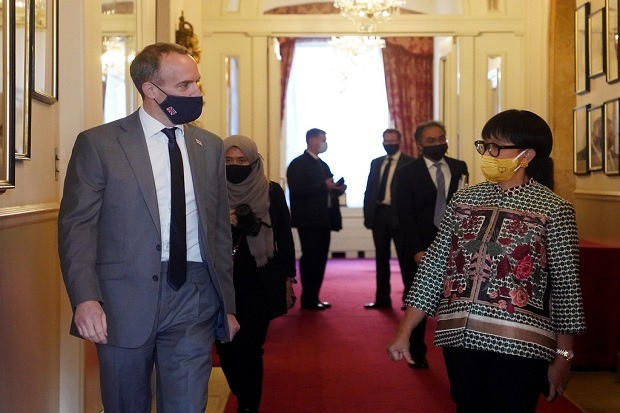Popular Reads
Top Results
Can't find what you're looking for?
View all search resultsPopular Reads
Top Results
Can't find what you're looking for?
View all search resultsIndonesia needs science diplomacy, now more than ever
Indonesia needs to envisage new and creative ways to build better relationships with countries globally.
Change text size
Gift Premium Articles
to Anyone
W
hen Foreign Minister Retno L.P. Marsudi recently led a government delegation to London as part of Indonesia’s efforts to procure COVID-19 vaccines, she warned about the prospect of wealthy nations scooping up billions of doses at the expense of developing countries like Indonesia. Her statement indicates the scientific and diplomatic challenges that the pandemic presents.
Indeed, the COVID-19 pandemic has exacerbated profound geopolitical shifts, created new tensions and allowed countries that excel in vaccine research and development to wield it as a geopolitical weapon or a diplomatic tool. In actual fact, however, science has been an integral part of the diplomatic strategy of many developed countries like the United States, the United Kingdom and China, but it is rarely discussed in the context of Indonesian diplomacy.
In addition to the pandemic, climate change and energy security are key 21st-century challenges. Science and technology underlies each and every one of these issues.
Today, no nation can stand alone or prosper without mastering science and technology. Science diplomacy, referring to international cooperation with science at its core, is the key to building resilience against these great challenges.
Scientists have long formed relationships with colleagues around the globe and acted as agents for peace during times when their governments were not getting along. For example, after World War II devastated Europe, the newly established European Council for Nuclear Research (CERN) encouraged post-war contact between German and Israeli physicists, which was often facilitated by the Jewish diaspora scattered throughout the world.
At present, Indonesia has yet to maximize the potential of its scientific diaspora as tools for diplomacy, despite the growing number of Indonesian scientists occupying strategic positions at world-class research institutions. Instead, the approach the Indonesian government often takes in utilizing its scientific diaspora hinges on repatriating them.
The problem with this approach is two-pronged: First, in today’s interconnected world, physical presence is of the least importance; second, strategic industries that breed innovation are not built by one or two competent individuals, and rather result from a complex interplay between world-class research that breeds knowledge, industries that support the commercialization of research, fair evidence-based policies and a robust market mechanism that attracts investment.
This is one of the reasons why bringing electric vehicle (EV) technologists like Ricky Elson back to the country has failed to kick-start the national EV initiative, despite its promising beginnings.
Rather than hastily recalling our scientific diaspora, we need to strengthen their positions abroad and help grow their influence in the institutions, industries and countries where they work, to make them an integral part of our diplomatic missions.
As diplomats, members of the scientific diaspora who occupy strategic positions abroad can bring opportunities for research collaboration from leading companies like Rolls-Royce and Tesla, as well as world-class research institutions, and revamp Indonesia’s EV and electric vehicle battery (EVB) industries toward maximizing the country’s potential to become the world’s largest producer of battery minerals.
The scientific diaspora can also help strengthen bilateral ties between Indonesia and its partners. For example, Indonesian scientists working at the best UK universities played a part in influencing their institutions to establish the UKICIS to help address Indonesia’s greatest societal challenges.
The consortium has facilitated collaboration and discussions between Indonesian Research and Technology Minister Bambang Brodjonegoro and his UK counterpart, Amanda Solloway, thus strengthening UK-Indonesia relations.
Science diplomacy is urgently needed. As US president-elect Joe Biden paves his path to the White House, his team has promised to “listen to science” in devising US foreign policy.
With Biden at helm, now is the right time to foster and strengthen research partnerships with the US on issues such as COVID-19, the climate and environmental sustainability.
Biden will seek to reverse many of the policies impacting these issues that were instituted under Trump. For example, the president-elect has said that he would lead the US in rejoining the Paris Climate Accord. With the US back in the fold, a rejuvenated global sustainability will not be good news for fossil-fuel dependent Indonesia.
Indonesia needs to envisage new and creative ways to build better relationships with countries globally. Instead of merely asking its ambassadors to expedite raw material exports, Indonesia must begin to support its scientists to initiate and strengthen research partnerships with the US and other scientific powerhouses like the UK and China to come up with scientific solutions to the world’s greatest challenges.
***
The writer is assistant professor at the University of Nottingham, and chairman of the UK-Indonesia Consortium for Interdisciplinary Sciences (UKICIS).










